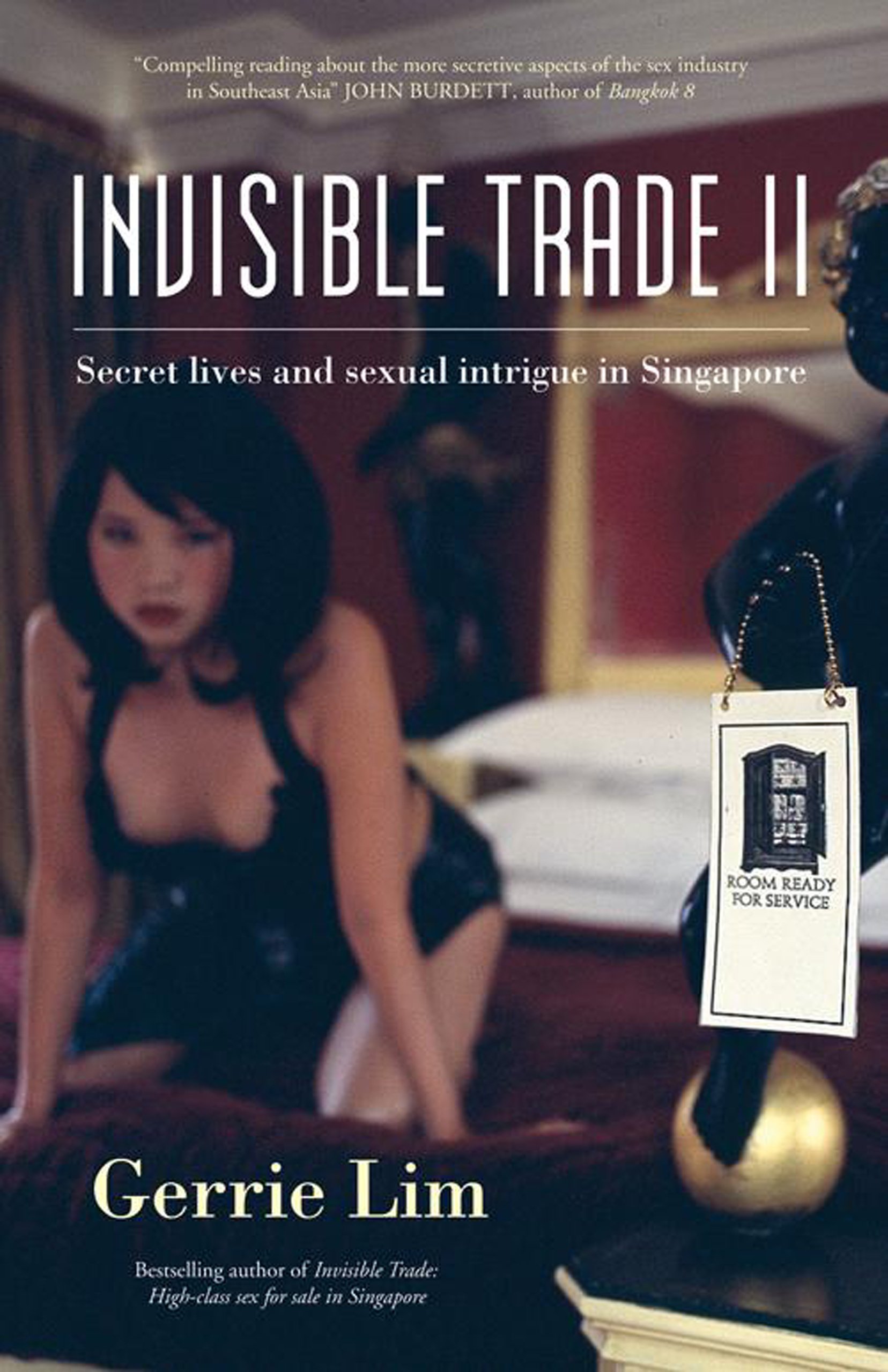
Ashley Chan seems to have it all figured out. University student by day, she’s somehow managed to find a night job that she’s good at pays the bills, and she enjoys, to a degree. The only ‘problem’? She’s an escort, and can’t tell anyone about it, lest they end up ruining her career and future in ultra-sensitive and conservative Singapore.
That secret identity has led to a strangely lonesome life, making up excuses for when she has to meet clients, and a struggle to form stable, long-term relationships. It’s not all bad of course, but as she herself puts it, only certain types of people can enter the sex trade and succeed, with its fair share of challenges and perks, just like any other job. Ashley tells it all in her brand new memoir Scarlet Harlot: My Double Life, and we found out more about the conception of the book and living life as an escort, in this exclusive interview with both Ashley and her co-writer, pop-culture writer Gerrie Lim:

Co-author Gerrie Lim, photo from here
Bakchormeeboy: Scarlet Harlot began as a series of blogposts. What made you two decide to transform it into a book, as opposed to keeping it online?
Gerrie: “Scarlet Harlot” did begin as a series of blogposts – the first one was in January 2017 — and we decided to transform it into a book as opposed to keeping it online when I got my deal on July 22, 2019. Frankly, we wanted a sense of permanency that a book brings and also, it actually pays money, as opposed to working for free — the blogs were done with no remuneration, and we did it on the Adult Industry Press website (www.aipdaily.com, though all the columns have now been removed) just to see if it would work, and it actually did!
Bakchormeeboy: Ashley, you’re a bit of an atypical escort, as there’s the stereotype that “educated” girls don’t do sex work. Is there a need to break the stereotype and assumptions about sex work, and legitimise it, especially with organisations like Project X advocating and supporting the trade?
Ashley: Thanks for saying I’m an atypical escort. The stereotype that “educated” girls don’t do sex work certainly doesn’t apply to me and yes, there is a need to break that cycle and legitimize it, because we escorts are different from “massage parlour girls” – they are less educated and barely speak English. Not to promote myself but I am tri-lingual – I speak and write English, Mandarin and Cantonese – and those are traits that are great if you want to be an escort, especially with foreign clients because you need to converse. You would be surprised when you get clients from Hong Kong, who prefer to speak in their native tongue.
Bakchormeeboy: One of the biggest themes that comes up time and again during the book is mental health and how lonely it can get as an escort. Especially considering how going for therapy combined with the prejudice against sex work, it seems like an impossible situation one would find herself in. How does a working girl keep herself sane, and learn to take care of her mental health better? Are there avenues she can turn to?
Ashley: Yes, one of the biggest themes is mental health and how lonely it can be as an escort, but how does an escort keep herself sane and learn to take care of her sanity? Well, first of all, you have boundaries. I like to be more relatable so I’ll share things about me that are real about myself but most of us have certain borders, to know what are the lines that people cannot cross. And secondly, have a safe space – in your head you create this space that, once you are in this space, you won’t be affected by anything else. Thirdly, you need to have “alone time” – it’s very important to recharge, because we talk to people so much. We need that time to really focus on ourselves.
Bakchormeeboy: Gerrie, how has your correspondence with Ashley and process co-writing this book further your career as a pop culture journalist? Were there any facts or information you learnt that you hadn’t in your previous research?
Gerrie: I see it as a continuation since I previously did a book as a ghostwriter with a porn star (“Absolute Mayhem,” with Monica Mayhem) and also, I think, I helped to demystify the persona of “Annabel Chong” (“Singapore Rebel,” which was published in the U.S. as “Searching for Annabel Chong”). In this case, however, I substituted a porn star for an escort and it’s actually the first book I’ve done on a single escort – my previous books “Invisible Trade” and “Invisible Trade 2” were composites of escorts I had met and interviewed.
What have I learned as a journalist? Well, I like to collect anecdotal stories and one that comes to mind was in Chapter 7, about “not confusing a client with a boyfriend,” and she gave an account of one such relationship — a guy I named Robert, who started out as a client and then became a boyfriend and whom she then saw as only a client when the interpersonal relationship didn’t work out. She was admittedly naïve and thought she was lucky to have found him and was upset when she was replaced by another girl. She learned that a client is a client and a boyfriend is a boyfriend and you shouldn’t do both, and she concludes that “dating is a waste of time.” It’s quite a sad and sorry tale, but it was brave of her to admit it. I like stories like that.

Bakchormeeboy: Ashley, you come off as a woman who is immensely confident and aware of who she is as a person. Were there ever any emotional moments you had in the process of writing this book, especially considering how many difficult incidents are recounted in this book?
Ashley: Do I come across as a woman who is immensely confident and aware of who I am as a person? Well, thanks for saying so. Were there any emotional moments in the process of writing? Yes, memories of my grandfather’s death, for one. He died in Malaysia but my last memory is of us having an argument about a silly thing and if I had known he would have gone and then died, I wouldn’t have had that quarrel. I regret not spending enough quality time with him. The awareness of who I am comes with a lot of pain, I would say.
Bakchormeeboy: Beyond the subject of sex work, the book often feels incredibly empowering, as an account of a woman who isn’t your typical docile subservient Asian woman, who really takes her life, career and sexuality into her own hands. Would you say that there’s an increasing number of woman like that in Singapore? Or do most modern women still conform to long-held gender stereotypes?
Ashley: Yes, I think there are an increasing number of women like that in Singapore now and this book is partially written to address that demographic. Do most women conform to gender-held stereotypes? Well, that’s a difficult question. It’s one of those “yes” and “no” questions, and I would prefer not to generalize an answer for it. It’s a very individualistic question. I would say, yes, to a certain extent modern women do still conform to social stereotypes, like you have to get married, have kids, have a family, before you turn too old. But also there’s an increasing number of women who prefer not to fall into that category.

Bakchormeeboy: Ashley, how different do you think your life would have turned out if you chose not to pursue the sex trade? Would you be as open-minded as you are today, or as financially stable?
Ashley: Well, parts of that are documented in the book, where I did promotion in supermarkets and working in F&B (food and beverage). But none of them paid as well as escorting — that’s true, it’s fair to say that. Would I be as open-minded today or as financially stable? Probably not. I’m not putting down people who do that but the reality is if sex work works for you, then you can enjoy a relatively better income if it works out but it’s a 50-50 kind of thing. It’s difficult to phrase it, in a non-offensive way. I would be financially stable eventually but it’s going to take a very long time. Especially with someone who doesn’t have much educational qualifications — it’s going to take a very very long time. I’ll see what happens after I graduate.
Bakchormeeboy: Could you comment on how the sex trade has been affected over the last few months due to the COVID-19 pandemic? Especially with how people like KTV girls are no longer able to do their main line of work.
Ashley: Since Covid, the incomes of escorts has dropped significantly, by as much as 60 percent. I have no idea what the KTV girls are doing since I don’t keep up with that industry now. However, to be honest, all industries are affected. I would just say don’t take sex work as an abnormal industry, it’s just as affected as any other industry. I think we should think about this with a more sympathetic point of view. It’s a very touchy situation. With the nightlife situation all effectively closed, we are all quite badly affected.

Bakchormeeboy: Ashley, you seem to be quite well-read, having namedropped authors like Natsuo Kirino or Keigo Higashino. Could you share what you happen to be reading at the moment?
Ashley: Yes, I’ve namedropped writers like Natsuo Kirino or Keigo Higashino because part of what they wrote concerned the sex industry. What am I reading now? I’m reading the news mainly, like the Financial Times and the Wall Street Journal. I’m not really reading much now because I’m having my exams!
Bakchormeeboy: Relationships, as mentioned in the book, are incredibly difficult to maintain as a sex worker, where one either has to come clean to their partner or hide it forever. Do you ever imagine that you’ll leave all this behind permanently and “settle down” for “normalcy”?
Ashley: Relationships are incredibly difficult to maintain as a sex worker, and one has to come clean or permanently hide it – yes, that’s true. But would I leave it all behind permanently and “settle down” for “normalcy”? It’s an open-ended answer. Who knows what the future might bring, right?

Dita von Teese, the ‘Queen of Burlesque’ Ashley considers an inspiration in her book. Photograph: John Russo/Contour by Getty Images
Bakchormeeboy: What’s next for you Gerrie – in terms of what aspects of the sex trade you haven’t written or researched about in detail yet?
Gerrie: Well, there are several topics like sugar babies (or “compensated sex”) and also I once considered doing a book on KTV girls. But there are strategies that you need to deploy to achieve those, though, and I don’t have access to them yet — like spending a lot of time in KTV bars, which might drive anyone crazy! Maybe I will, someday, when this Covid crisis is over.
Bakchormeeboy: If it’s one message you wish for readers to take away after reading this book, what would it be?
Ashley: The importance of education, and you should not be over-reliant on sex work but remain diligent in chasing other pursuits. Make sure you have an exit plan.
Gerrie: Tom Jones was once asked, “What’s better, sex or performing?” He answered: “It’s close, but performing lasts longer.” That’s a way of saying why make something you do for fun as work? Unless, of course, you’re a performer – and that’s maybe that’s why they do drugs, I guess.
Scarlet Harlot: My Double Life is published by Epigram and available here

